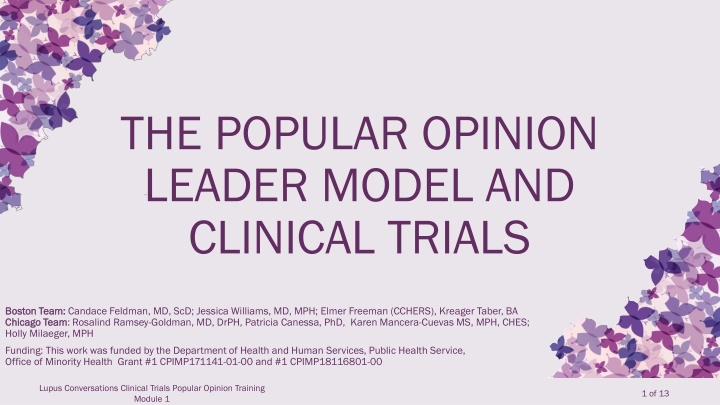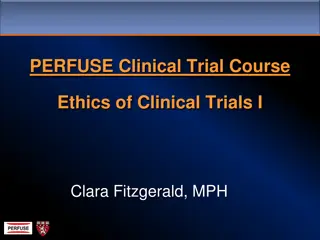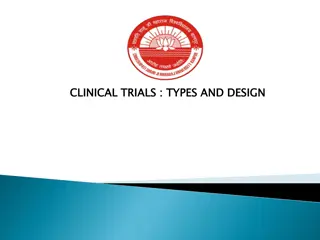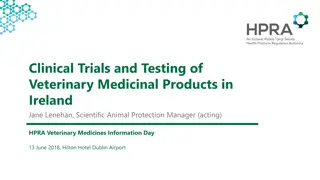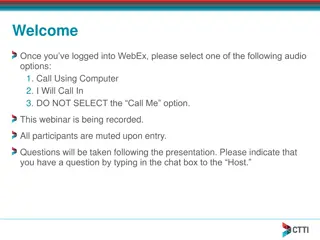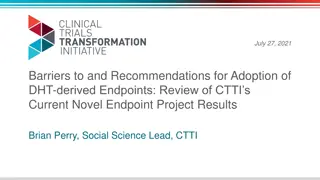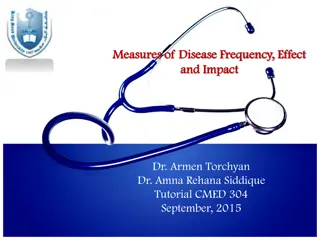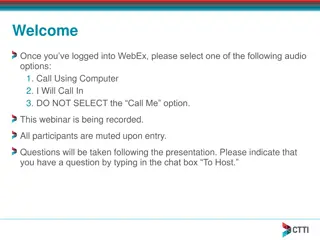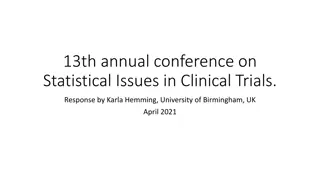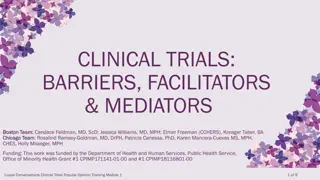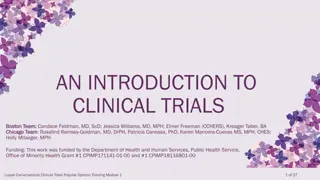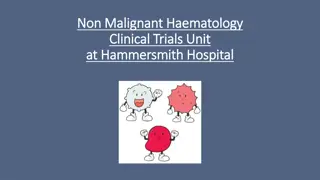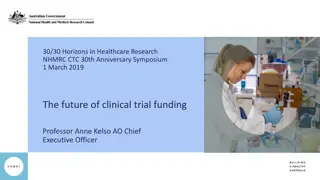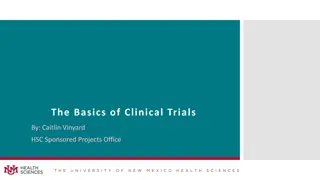Lupus Clinical Trials Program and Disease Prevalence
Lupus Clinical Trials Program aims to increase awareness and education on lupus through community partnerships. Lupus is a chronic inflammatory disease that can impact any organ. Its prevalence varies among different population groups, with higher rates in certain ethnicities. This training module delves into the Popular Opinion Leader Model and its role in educating communities about chronic diseases like lupus.
Download Presentation

Please find below an Image/Link to download the presentation.
The content on the website is provided AS IS for your information and personal use only. It may not be sold, licensed, or shared on other websites without obtaining consent from the author.If you encounter any issues during the download, it is possible that the publisher has removed the file from their server.
You are allowed to download the files provided on this website for personal or commercial use, subject to the condition that they are used lawfully. All files are the property of their respective owners.
The content on the website is provided AS IS for your information and personal use only. It may not be sold, licensed, or shared on other websites without obtaining consent from the author.
E N D
Presentation Transcript
THE POPULAR OPINION LEADER MODEL AND CLINICAL TRIALS Boston Team: Boston Team: Candace Feldman, MD, ScD; Jessica Williams, MD, MPH; Elmer Freeman (CCHERS), Kreager Taber, BA Chicago Team Chicago Team: Rosalind Ramsey-Goldman, MD, DrPH, Patricia Canessa, PhD, Karen Mancera-Cuevas MS, MPH, CHES; Holly Milaeger, MPH Funding: This work was funded by the Department of Health and Human Services, Public Health Service, Office of Minority Health Grant #1 CPIMP171141-01-00 and #1 CPIMP18116801-00 Lupus Conversations Clinical Trials Popular Opinion Training Module 1 1 of 13
Background and Introduction Lupus Clinical Trials Program Lupus Clinical Trials Program 4 year partnership between health centers and communities to increase lupus awareness Use the Popular Opinion Leader (POL) Popular Opinion Leader (POL) Model Model to Lead Community Education Strategies Use Social Networks Social Networks to Educate Communities About Chronic Diseases Lupus Conversations Clinical Trials Popular Opinion Training Module 1 2 of 13
Background on Lupus Lupus is a chronic (permanent) inflammatory disease chronic (permanent) inflammatory disease that can affect any organ of the body The causes of lupus are still unknown Lupus is not a contagious (like the flu) or hereditary disease (like sickle cell disease) Lupus Conversations Clinical Trials Popular Opinion Training Module 1 3 of 13
How Common is Lupus? Prevalence Prevalence- - a measurement of all individuals affected by a disease at a particular time (Center for Disease Control and Prevention) In 2008, the United States had a lupus prevalence of about 161,000 patients with definite lupus with definite lupus and 322,000 with definite or probable lupus definite or probable lupus (Helmick et al., 2008) 161,000 patients 322,000 with Lupus Conversations Clinical Trials Popular Opinion Training Module 1 4 of 13
How Common is Lupus? Different Populations have Different Prevalence Different Populations have Different Prevalence Rates for Lupus Rates for Lupus Blacks Blacks (128 people/100,000) American Indians/Alaska Natives American Indians/Alaska Natives (178/100,000 people) Hispanics Hispanics (90.5/100,000 people) Asians Asians (94.7/100,000 people) All have higher prevalence rates higher prevalence rates than Whites (47.5/100,000 people) Whites Lupus can affect people of any age, race or ethnic origin, and gender identity origin, and gender identity, and there is no way to prevent lupus any age, race or ethnic Lupus Conversations Clinical Trials Popular Opinion Training Module 1 5 of 13
The Popular Opinion Leader (POL) Model Popular Opinion Leaders Popular Opinion Leaders Present in all communities. Usually respected, well well- -informed, and trusted informed, and trusted members of a social group respected, The Popular Opinion Leader Model The Popular Opinion Leader Model * A community community- -level level intervention designed to influence norms, behaviors, intentions and norms, behaviors, intentions and prompt actions prompt actions in a specific community *developed by CDC for community prevention studies Lupus Conversations Clinical Trials Popular Opinion Training Module 1 6 of 13
How does a POL Influence Their Community? Social Network Social Network- - a set of individuals or organizations who share common interests POLs can spread information about POLs can spread information about health and scientific research health and scientific research through their social networks through their social networks Lupus Conversations Clinical Trials Popular Opinion Training Module 1 7 of 13
How do POLs Help Their Communities? By spreading information, POLs help to By spreading information, POLs help to Increase awareness and understanding awareness and understanding of lupus in a community Help lupus patients reach specialists specialists to help care for their lupus Spread positive messages Spread positive messages about science-based research and clinical trials Build partnerships partnerships between researchers and the surrounding community Lupus Conversations Clinical Trials Popular Opinion Training Module 1 8 of 13
How Do POLs Spread Information? POLs spread the information they know by speaking with communities, congregations, and their own social networks communities, congregations, and their own social networks Participate in round-table discussions or community forums Conduct surveys Conduct surveys or ask others lupus, clinical trials, and healthcare, and spread the information they know information they know ask others about their knowledge of spread the Give out fact sheets, info-cards, or other tools as conversation starters conversation starters and to remind people of the information they discussed Lupus Conversations Clinical Trials Popular Opinion Training Module 1 9 of 13
How is a POLs Success Measured? The POL model is often used in partnership academic centers POL participation in studies is just as valued as professional input POLs record who they ve spoken with and observations about meetings POL success if measured by the number of people they are able to engage and persuade with the intended message POLs demonstrate their influence by changing health seeking norms, in this case increasing the understanding of lupus clinical trials in their communities. partnership with Lupus Conversations Clinical Trials Popular Opinion Training Module 1 10 of 13
Summary Popular Popular Opinion Leaders Opinion Leaders A trusted person in their community who is able to spread information through their social network spread information POLs can help spread information about lupus, clinical trials, and healthcare POLs help strengthen researcher-community partnerships Lupus Conversations Clinical Trials Popular Opinion Training Module 1 11 of 13
QUESTIONS? THANK YOU! Lupus Conversations Clinical Trials Popular Opinion Training Module 1 12 of 13
Funding and Acknowledgements Funding: This work was funded by the Department of Health and Human Services, Public Health Service, Office of Minority Health Grant #1 CPIMP171141-01-00 and #1 CPIMP18116801-00 Boston Team: Boston Team: Candace Feldman, MD, ScD; Jessica Williams, MD, MPH; Elmer Freeman (CCHERS), Kreager Taber, BA Chicago Team Chicago Team: Rosalind Ramsey-Goldman, MD, DrPH, Patricia Canessa, PhD, Karen Mancera-Cuevas MS, MPH, CHES, Holly Milaeger, MPH 13
